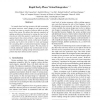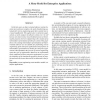57 search results - page 2 / 12 » Reverse Architecting Approach for Complex Systems |
RTSS
2009
IEEE
13 years 11 months ago
2009
IEEE
In complex hard real-time systems with tight constraints on system resources, small changes in one component of a system can cause a cascade of adverse effects on other parts of t...
CASCON
1997
13 years 6 months ago
1997
As software systems become increasingly complex to build developers are turning more and more to integrating pre-built components from third party developers into their systems. T...
PADS
2005
ACM
13 years 10 months ago
2005
ACM
Efficient computer simulation of complex physical phenomena has long been challenging due to their multiphysics and multi-scale nature. In contrast to traditional time-stepped exe...
SYNASC
2006
IEEE
13 years 10 months ago
2006
IEEE
In the last years, as object-oriented software systems became more and more complex, the need of performing automatically reverse engineering upon these systems has increased sign...
ICFCA
2005
Springer
13 years 10 months ago
2005
Springer
A key difficulty in the maintenance and evolution of complex software systems is to recognize and understand the implicit dependencies that define contracts that must be respecte...


